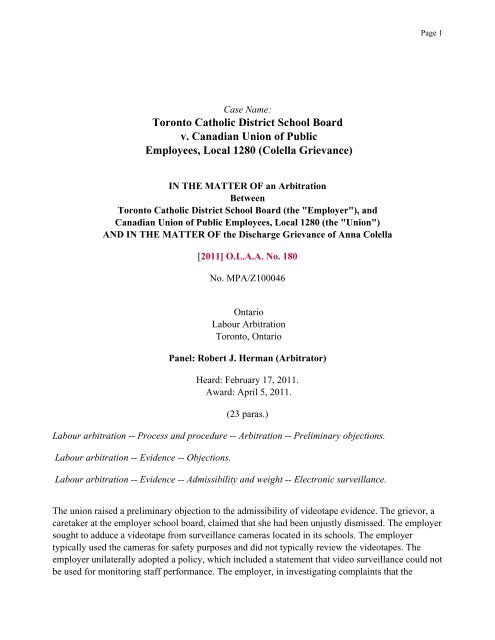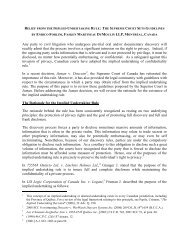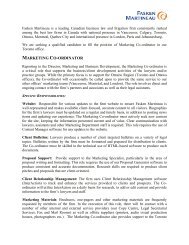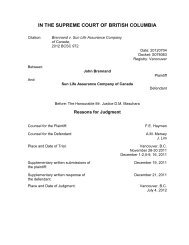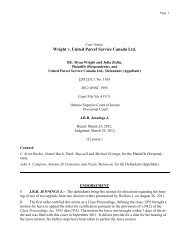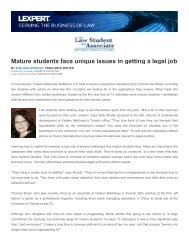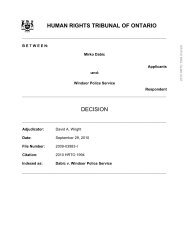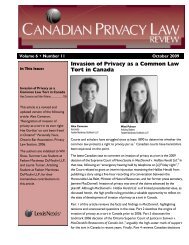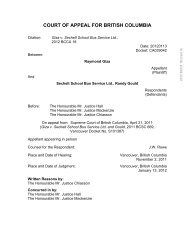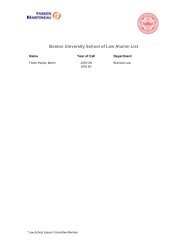Toronto Catholic District School Board v. Canadian Union of Public ...
Toronto Catholic District School Board v. Canadian Union of Public ...
Toronto Catholic District School Board v. Canadian Union of Public ...
You also want an ePaper? Increase the reach of your titles
YUMPU automatically turns print PDFs into web optimized ePapers that Google loves.
Page 1<br />
Case Name:<br />
<strong>Toronto</strong> <strong>Catholic</strong> <strong>District</strong> <strong>School</strong> <strong>Board</strong><br />
v. <strong>Canadian</strong> <strong>Union</strong> <strong>of</strong> <strong>Public</strong><br />
Employees, Local 1280 (Colella Grievance)<br />
IN THE MATTER OF an Arbitration<br />
Between<br />
<strong>Toronto</strong> <strong>Catholic</strong> <strong>District</strong> <strong>School</strong> <strong>Board</strong> (the "Employer"), and<br />
<strong>Canadian</strong> <strong>Union</strong> <strong>of</strong> <strong>Public</strong> Employees, Local 1280 (the "<strong>Union</strong>")<br />
AND IN THE MATTER OF the Discharge Grievance <strong>of</strong> Anna Colella<br />
[2011] O.L.A.A. No. 180<br />
No. MPA/Z100046<br />
Ontario<br />
Labour Arbitration<br />
<strong>Toronto</strong>, Ontario<br />
Panel: Robert J. Herman (Arbitrator)<br />
Heard: February 17, 2011.<br />
Award: April 5, 2011.<br />
(23 paras.)<br />
Labour arbitration -- Process and procedure -- Arbitration -- Preliminary objections.<br />
Labour arbitration -- Evidence -- Objections.<br />
Labour arbitration -- Evidence -- Admissibility and weight -- Electronic surveillance.<br />
The union raised a preliminary objection to the admissibility <strong>of</strong> videotape evidence. The grievor, a<br />
caretaker at the employer school board, claimed that she had been unjustly dismissed. The employer<br />
sought to adduce a videotape from surveillance cameras located in its schools. The employer<br />
typically used the cameras for safety purposes and did not typically review the videotapes. The<br />
employer unilaterally adopted a policy, which included a statement that video surveillance could not<br />
be used for monitoring staff performance. The employer, in investigating complaints that the
Page 2<br />
grievor was not doing her work and was leaving the school during work hours, reviewed the<br />
videotapes to determine whether the grievor had answered its questions honestly.<br />
HELD: Preliminary objection dismissed. It was not unfair or unreasonable for the employer to have<br />
reviewed the videotapes. The employer did not review the videotapes <strong>of</strong> the grievor as part <strong>of</strong> a<br />
practice <strong>of</strong> checking tapes for performance deficiencies. It had received a complaint and was<br />
investigating it, and the grievor had provided information that did not appear to be accurate. It<br />
would have been detrimental to a full and fair hearing to preclude either party from seeking to rely<br />
upon the arguably relevant videotape evidence.<br />
Statutes, Regulations and Rules Cited:<br />
Labour Relations Act, s. 48(12)<br />
Municipal Freedom <strong>of</strong> Information and Protection <strong>of</strong> Privacy Act, Part II, s. 31, s. 31(b), s. 32(c), s.<br />
33, s. 51, s. 51(1), s. 51(2), s. 52(3), s. 52(4)<br />
Appearances:<br />
For the Employer: Sharon Duffy, Bob Dubniak.<br />
For the <strong>Union</strong>: Denise Carter, David Gorringe, George Ferlenda, Anna Colella.<br />
INTERIM AWARD<br />
1 The grievor, Ms. Anna Colella; is a caretaker who was working on modified duties for a<br />
number <strong>of</strong> years at one <strong>of</strong> the schools operated by the Employer, the <strong>Toronto</strong> <strong>Catholic</strong> <strong>District</strong><br />
<strong>School</strong> <strong>Board</strong> (the "<strong>Board</strong>"). She was discharged for improper performance, leaving the premises<br />
without authorization, taking extended breaks, incorrectly documenting cleaning tasks and break<br />
times, and untruthfulness. A grievance was filed over her discharge. It is agreed that I have<br />
jurisdiction.<br />
2 The parties agreed to first address the <strong>Union</strong>'s preliminary objection to the admissibility <strong>of</strong><br />
certain videotape evidence. The instant decision deals only with this preliminary objection.<br />
3 For a number <strong>of</strong> years, the <strong>Board</strong> has used surveillance cameras in some <strong>of</strong> its schools. The<br />
cameras are located in a number <strong>of</strong> common areas, such as hallways and cafeterias, and on the<br />
exterior <strong>of</strong> school buildings. The cameras are in plain sight, readily visible, and there are signs<br />
posted in the schools indicating that the premises are under such surveillance. Access to the
Page 3<br />
videotapes is restricted to administrative staff, principals and vice-principals, and the Manager <strong>of</strong><br />
Operations. The camera system has typically been used by the <strong>Board</strong> to protect the safety <strong>of</strong> persons<br />
on school premises and to protect property; for example, to deter break-ins, vandalism, burglary,<br />
fires being set and so on. The <strong>Board</strong> does not review the videotapes at regular intervals nor does it<br />
review them regularly or occasionally to check on the performance <strong>of</strong> employees. Prior to the<br />
instant case, videotapes were reviewed perhaps six times by <strong>Board</strong> personnel, to review incidents<br />
such as a burglary or a fire, and once to verify when a caretaker departed from a school. In this<br />
latter case, no discipline resulted. Until the instant matter, the videotape system has not been used in<br />
support <strong>of</strong> any disciplinary action against an employee. The <strong>Union</strong> has been aware <strong>of</strong> the use <strong>of</strong> the<br />
video surveillance system and does not object to the use <strong>of</strong> the system for purposes such as<br />
reviewing videotapes to assist in deterring burglaries or fires or catching those responsible for them.<br />
4 Part II <strong>of</strong> the Municipal Freedom <strong>of</strong> Information and Protection <strong>of</strong> Privacy Act (the "Act")<br />
applies to the <strong>Board</strong>. Relevant sections read:<br />
Use <strong>of</strong> personal information<br />
31. An institution shall not use personal information in its custody or under its<br />
control except,<br />
(a)<br />
if the person to whom the information relates has identified that<br />
information in particular and consented to its use;<br />
(b)<br />
for the purpose for which it was obtained or compiled or for consistent<br />
purpose; or<br />
(c)<br />
for a purpose for which the information may be disclosed to the institution<br />
under section 32 or under section 42 <strong>of</strong> the Freedom <strong>of</strong> Information and<br />
Protection <strong>of</strong> Privacy Act.<br />
Where disclosure is permitted<br />
...<br />
32. An institution shall not disclose personal information in its custody or under<br />
its control except,<br />
(c)<br />
for the purposes for which it was obtained or compiled or for a consistent<br />
purpose;<br />
...
Page 4<br />
Consistent purpose<br />
...<br />
33. The purpose <strong>of</strong> a use or disclosure <strong>of</strong> personal information that has been<br />
collected directly from the individual to whom the information relates is a<br />
consistent purpose under clauses 31 (b) and 32 (c) only if the individual might<br />
reasonably have expected such a use or disclosure.<br />
Information otherwise available<br />
51. (1) This Act does not impose any limitation on the information otherwise<br />
available to a party to litigation.<br />
(2) This Act does not affect the power <strong>of</strong> a court or tribunal to compel a witness to<br />
testify or compel the production <strong>of</strong> a document.<br />
Non-application <strong>of</strong> Act<br />
...<br />
52. (3) Subject to subsection (4), this Act does not apply to records collected,<br />
prepared, maintained or used by or on behalf <strong>of</strong> an institution in relation to any <strong>of</strong><br />
the following:<br />
...<br />
Exception<br />
1. Proceedings or anticipated proceedings before a court, tribunal or other<br />
entity relating to labour relations or to the employment <strong>of</strong> a person by the<br />
institution.<br />
(4) This Act applies to the following records:<br />
...<br />
1. An agreement between an institution and a trade union.<br />
5 The Information and Privacy Commissioner <strong>of</strong> Ontario has issued "Guidelines for Using Video<br />
Surveillance Cameras in <strong>School</strong>s" (revised July 2009) (the "Guidelines"). On page 1, the Guidelines
Page 5<br />
state "These Guidelines were created to assist school boards intending to use or expand existing<br />
video surveillance to introduce these programs in a manner that ensures stringent privacy controls.<br />
The IPC recommends that all school boards using video surveillance implement formal policies<br />
governing their use." On page 13, the Guidelines state "Video surveillance should not be used for<br />
monitoring staff performance." The Guidelines do not make reference to sections 51or 52 <strong>of</strong> the<br />
Act.<br />
6 The <strong>Board</strong> has adopted a Policy concerning "Video Security Surveillance" (the "Policy"). There<br />
is no evidence that the Policy was negotiated with and agreed to by the <strong>Union</strong>, nor is the Policy<br />
found in the Collective Agreement. Regulation #7 <strong>of</strong> the Policy states "Video surveillance shall not<br />
be used for monitoring staff performance."<br />
7 In this context, the events in issue took place. During the last week <strong>of</strong> January, 2010, the<br />
grievor's supervisor, Fabrizio Macieri, received a phone call from caretakers at Michael Power/St.<br />
Joseph, one <strong>of</strong> the <strong>Board</strong> schools. They phoned to say that they needed to see Macieri urgently.<br />
Because <strong>of</strong> other demands, Macieri could not attend at the school until Friday, January 29, 2010.<br />
That day, he met with some <strong>of</strong> the caretakers there. They were irate and upset because they claimed<br />
that the grievor was not performing her work. They complained that she was spending hours in the<br />
computer room and was palming <strong>of</strong>f her work onto them. They also claimed that she would leave<br />
the building. Macieri and the caretakers walked around parts <strong>of</strong> the building. Areas the grievor<br />
should have cleaned had not been cleaned. Macieri took photos <strong>of</strong> those areas. He told the other<br />
caretakers to clean up the grievor's areas that had not been cleaned. He also inspected the grievor's<br />
entries in the log books, books the grievor was required to fill out daily, and he found parts <strong>of</strong> them<br />
to be empty or tasks recorded there that had apparently been performed by others. The caretakers<br />
told Macieri that the grievor had been doing nothing since November.<br />
8 Macieri spoke with his manager, Suzy Kawasaki, later that day. On Wednesday, February 3,<br />
2010, Macieri and Kawasaki drove to the grievor's school, parking across the street. While sitting in<br />
the car, they observed the grievor leaving the school premises, crossing the street and going into a<br />
Tim Horton's fast food outlet and then into a variety store. Caretakers are not to leave their school<br />
during shifts without telling their supervisor, logging in that they are leaving, or by calling security.<br />
Macieri and Kawasaki went across the street to greet the grievor but somehow missed encountering<br />
her. They then went into the school and spoke to the Principal and Vice-Principal, explaining why<br />
they were there. They saw the grievor enter the school, and found her shortly thereafter having<br />
c<strong>of</strong>fee with another cleaner in the library. By then, about 30 to 40 minutes had passed since they<br />
had seen the grievor leave the premises to go to the Tim Horton's.<br />
9 The other cleaner left the library at their request. When asked where she had gotten the c<strong>of</strong>fee,<br />
the grievor replied that someone else had brought it for her. When asked what work she had<br />
performed, the grievor showed Macieri and Kawasaki the rooms she said she had cleaned. They<br />
were the same rooms Macieri had asked other cleaners to clean the Friday before because the<br />
grievor had not cleaned them. When asked again about buying the c<strong>of</strong>fee, the grievor again denied
Page 6<br />
having bought it, acknowledging that she was aware that she was not to leave the premises during<br />
her shift. She was then told that they had seen her leaving the building and were aware <strong>of</strong> how long<br />
a break she had been taking. At that point, the grievor told them that she didn't want to say anything<br />
further until she spoke with her <strong>Union</strong> representative. The grievor was asked to return her keys and<br />
leave the school, and she was advised that she would be contacted for a meeting. The grievor did as<br />
requested. Macieri then questioned other caretakers on shift.<br />
10 Macieri and Kawasaki determined that the grievor had been lying to them about leaving the<br />
school to go get c<strong>of</strong>fee and suspected she was also lying to them about what work she had done.<br />
While at the school on February 3, 2010, they reviewed the grievor's log books and sign-in/sign-out<br />
sheets and took copies <strong>of</strong> them, discovering that there were now discrepancies between them and<br />
what had been in them when Macieri had looked at them previously on January 29, 2010. Then, no<br />
tasks were entered for January 29, 2010, but on February 3, 2010, a whole week <strong>of</strong> tasks had been<br />
entered.<br />
11 Macieri checked the videotapes, to see whether they verified or contradicted what the grievor<br />
was telling them about the work she had performed. He reviewed the tapes for February 3, 2010,<br />
and because <strong>of</strong> the complaints from the other caretakers and her untruthfulness about the incident on<br />
February 3, 2010, he also reviewed about six or seven days randomly selected from the previous<br />
three to four weeks. Because the <strong>Union</strong> objects to the introduction <strong>of</strong> the videotapes, the <strong>Board</strong> did<br />
not lead evidence <strong>of</strong> what was discovered on the videotapes when Macieri reviewed them.<br />
12 In its submissions, the <strong>Union</strong> does not challenge the use <strong>of</strong> surveillance cameras in the schools<br />
or the taking and collection <strong>of</strong> videotape recordings but it does object to the admissibility <strong>of</strong> the<br />
videotape evidence in this proceeding. The <strong>Union</strong> submits that the <strong>Board</strong> is seeking to use the<br />
videotapes <strong>of</strong> the grievor at work for purposes <strong>of</strong> monitoring her performance, contrary to its own<br />
policy that indicates it will not do so. It makes no difference, the <strong>Union</strong> argues, whether the<br />
videotapes are reviewed regularly in order to monitor how staff are performing their work or in a<br />
particular instance because <strong>of</strong> concern over a specific staff member. In either case, the <strong>Union</strong><br />
submits, the <strong>Board</strong> is using the videotapes in order to monitor staff performance. It asserts that the<br />
Guidelines dictate that the <strong>Board</strong> devise and publish a policy if it intends to use surveillance<br />
cameras in the schools, and because <strong>of</strong> the provisions <strong>of</strong> the Act, any policy it adopts has to be in<br />
compliance with the Guidelines. While the Policy as written complies with the requirements <strong>of</strong> the<br />
Guidelines, the <strong>Union</strong> submits that the <strong>Board</strong>'s actions in reviewing the videotapes concerning the<br />
grievor and seeking to introduce them in this proceeding are in breach <strong>of</strong> the Policy.<br />
13 The <strong>Board</strong> responds that the Guidelines are just "guidelines", recommendations or suggestions<br />
not binding upon the <strong>Board</strong>. It submits that the provisions <strong>of</strong> the Act do not apply to the matter in<br />
issue because <strong>of</strong> sections 51(1) and (2), which contemplate that a party to litigation will be entitled<br />
to production or disclosure consistent with applicable rules, despite any other provisions <strong>of</strong> the Act.<br />
When read in conjunction with section 48 (12) <strong>of</strong> the Labour Relations Act, the <strong>Board</strong> submits, it is<br />
clear that an arbitrator retains authority to order production <strong>of</strong> material relevant to the matter and
Page 7<br />
authority to admit such evidence in the arbitration. Even if the Act did apply to the admissibility <strong>of</strong><br />
the videotape evidence, sections 31 (b) and 32 (c) permit the use <strong>of</strong> material collected for a purpose<br />
consistent with the purpose for which it was obtained, and section 33 indicates that a use is for a<br />
consistent purpose where the individual might reasonably have expected such use or disclosure. The<br />
<strong>Board</strong> asserts that it would reasonably have been anticipated by the grievor and/or the <strong>Union</strong> that<br />
the videotapes would be reviewed to determine whether the grievor was being truthful about the<br />
work she had performed. The <strong>Board</strong> submits that the review <strong>of</strong> the videotapes and its intention to<br />
introduce them in evidence is not inconsistent with the Policy statement that video surveillance will<br />
not be used to monitor staff performance. Here, it notes, the <strong>Board</strong> responded to a particular<br />
complaint from fellow caretakers that the grievor was not performing her job. it observed the<br />
grievor and interviewed her and other caretakers, examined some <strong>of</strong> the rooms she was to have<br />
cleaned, as well as her log book entries and other records, and determined that the grievor had not<br />
been truthful and probably had not been performing her job. Only then did it review some <strong>of</strong> the<br />
videotapes. The <strong>Board</strong> submits that this does not constitute "monitoring" performance. It argues that<br />
it would be unfair if the grievor could lie about some events and the <strong>Board</strong> was prevented from<br />
demonstrating through the videotapes that the grievor was lying. Alternatively, the <strong>Board</strong> notes that<br />
its Policy is not a policy agreed to or adopted by the <strong>Union</strong>, but a policy it has unilaterally adopted<br />
outside the Collective Agreement, and even its actions might be in breach <strong>of</strong> the Policy, the<br />
existence <strong>of</strong> the Policy does not preclude it from seeking to tender the videotapes in evidence.<br />
14 The parties referred to a number <strong>of</strong> arbitration decisions, but none <strong>of</strong> them consider what<br />
constitutes "monitoring" staff performance.<br />
15 For purposes <strong>of</strong> the objection, the videotapes are assumed to contain arguably relevant<br />
material. Turning first to the issue <strong>of</strong> the applicability <strong>of</strong> the provisions <strong>of</strong> the Act, neither party<br />
relies upon section 52 (3) <strong>of</strong> the Act, which stipulates that the Act does not apply to records used by<br />
an institution in relation to a proceeding before a tribunal or other entity relating to labour relations<br />
or the employment <strong>of</strong> the individual by the institution. This arbitration is such a proceeding.<br />
Accordingly, the Act may not apply at all to the records in question ins<strong>of</strong>ar as the issue <strong>of</strong><br />
introducing those records into evidence in this arbitration is concerned. However, whether or not<br />
section 52 (3) by itself excludes the application <strong>of</strong> other provisions <strong>of</strong> the Act to the matter in issue,<br />
section 51 <strong>of</strong> the Act preserves the authority <strong>of</strong> an arbitrator to rule upon production and<br />
admissibility questions despite other provisions <strong>of</strong> the Act.<br />
16 As to the impact <strong>of</strong> the Information and Privacy Commissioner's Guidelines, there does not<br />
appear to be any authority for the proposition that school boards are required by law to follow the<br />
Guidelines. As noted above, at page 1 the Guidelines state that "These Guidelines were created to<br />
assist school boards intending to use or expand existing video surveillance to introduce these<br />
programs in a manner that ensures stringent privacy controls. The IPC recommends that all school<br />
boards using video surveillance implement formal policies governing their use." These are<br />
"guidelines", recommendations for policies to be adopted by school boards. And as "guidelines",<br />
absent statutory or regulatory requirement that they be applied and followed by the <strong>Board</strong>, the
Page 8<br />
Guidelines are not binding upon the <strong>Board</strong>. Further, as the Guidelines do not refer to sections 51<br />
and 52 <strong>of</strong> the Act, it is not easy to discern from them what the Commissioner's position is or would<br />
be on the use <strong>of</strong> videotape evidence in an arbitration, the matter in issue here.<br />
17 The issue then is whether the <strong>Board</strong> Policy precludes the use <strong>of</strong> videotapes in this proceeding.<br />
The Policy states that "Video surveillance shall not be used for monitoring staff performance." The<br />
videotapes were not surreptitiously made, and the grievor and other employees were aware that the<br />
areas in which they worked were being filmed. The word "monitoring" suggests a viewing,<br />
checking or surveillance over a period <strong>of</strong> time, so that "monitoring" staff performance involves<br />
viewing employees' performance over a period <strong>of</strong> time to determine how they are performing.<br />
Monitoring would occur, for example, if the <strong>Board</strong> were to regularly or periodically review the<br />
videotapes as a method <strong>of</strong> checking the work performance <strong>of</strong> employees. The Policy does not<br />
permit this use <strong>of</strong> the videotapes. However, the <strong>Board</strong> did not review the videotapes <strong>of</strong> the grievor<br />
at work as part <strong>of</strong> a general review <strong>of</strong> the videotapes to see how any other caretakers or the grievor<br />
were performing their work.<br />
18 Rather, the <strong>Board</strong> reviewed the videotapes for a particular period <strong>of</strong> time after it had received<br />
a complaint about the grievor's performance related to that period and then investigated that<br />
complaint. Before it reviewed any videotapes, the <strong>Board</strong> uncovered evidence <strong>of</strong> non-performance,<br />
and after interviewing her and inspecting her log books and other written records, it believed that<br />
the grievor was not being truthful about her behaviour and performance, both reasonable<br />
conclusions for the <strong>Board</strong> to have reached based upon the evidence it had by then discovered. Only<br />
at that point did the <strong>Board</strong> review videotapes <strong>of</strong> the grievor at work, and it did so for days within the<br />
period subject <strong>of</strong> allegations by the other caretakers. The videotape <strong>of</strong> February 3, 2010 was first<br />
reviewed, and then other dates to determine if the grievor had been lying about cleaning her<br />
assigned rooms. Those videotapes were not reviewed as part <strong>of</strong> a pre-existing monitoring process,<br />
but as a search for evidence with respect to particular allegations against the grievor, allegations the<br />
grievor denied and that the <strong>Board</strong> on reasonable grounds believed to be true. In these circumstances,<br />
the review <strong>of</strong> the videotapes did not constitute part <strong>of</strong> a "monitoring" <strong>of</strong> staff performance, and<br />
seeking to introduce then into evidence does not constitute or sanction a breach <strong>of</strong> the Policy.<br />
19 Alternatively, assuming that the introduction <strong>of</strong> the videotapes into evidence would be in<br />
breach <strong>of</strong> the Policy, it does not follow that the videotapes would not still be admissible. There is no<br />
objection to the recording <strong>of</strong> the videotapes and, as noted, for purposes <strong>of</strong> the objection, the<br />
videotapes are taken to contain arguably relevant evidence. Since the Policy is not policy contained<br />
in a collective agreement or otherwise reflective <strong>of</strong> an agreement between the parties, the<br />
evidentiary issue is whether it would for some reason be unfair, unreasonable or inappropriate to<br />
permit the introduction <strong>of</strong> this evidence at the arbitration.<br />
20 In the circumstances, I cannot find that it was unfair or unreasonable for the <strong>Board</strong> to have<br />
reviewed the videotapes. The <strong>Board</strong> did not have a practice <strong>of</strong> reviewing tapes to monitor staff<br />
performance, and it did not review the videotapes <strong>of</strong> the grievor as part <strong>of</strong> a practice <strong>of</strong> checking
Page 9<br />
tapes for performance deficiencies. It had received a complaint and was investigating it, and the<br />
grievor had provided information that did not appear to be accurate. The videotapes existed and<br />
could be checked to verify or to undermine the grievor's assertions. It was reasonable for the <strong>Board</strong><br />
to check the videotapes, and indeed, it might have acted unreasonably had it not checked them to<br />
see if there was evidence confirming the grievor's story, just as it might have acted unreasonably<br />
and unfairly if the <strong>Board</strong> had denied access to the videotapes to the <strong>Union</strong>. If the videotapes support<br />
the grievor's story, it would be unfair to prevent the <strong>Union</strong> from seeking to rely upon them in this<br />
arbitration. Similarly, in the face <strong>of</strong> the reasonable grounds it had for its belief that the grievor had<br />
not been performing her job adequately and the grievor's denial <strong>of</strong> certain facts obtained through its<br />
investigation, it would be unfair to preclude the <strong>Board</strong> from relying upon videotape evidence<br />
permissibly and openly recorded that the <strong>Board</strong> asserts will demonstrate what really occurred.<br />
Precluding the <strong>Board</strong> from relying upon the videotape evidence would be particularly unfair if the<br />
grievor were to testify to a version <strong>of</strong> events that the videotapes demonstrate to be inaccurate.<br />
21 Accordingly, even if the reliance upon the videotapes here would somehow be in breach <strong>of</strong> the<br />
<strong>Board</strong> Policy, it would in my view be detrimental to a full and fair hearing to preclude either party<br />
from seeking to rely upon the arguably relevant videotape evidence.<br />
22 In the result, the <strong>Board</strong> is not precluded from seeking to introduce into evidence the<br />
videotapes in issue.<br />
23 This matter will continue on dates previously scheduled.<br />
Dated at <strong>Toronto</strong> this 5th day <strong>of</strong> April, 2011<br />
Robert J. Herman - Arbitrator<br />
qp/s/qlspi


